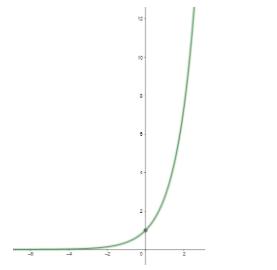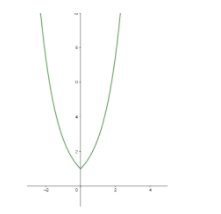
Let $g:R\to R$ be a differentiable function with g (0) = 0, g’(0) = 0 and $g'(1)\ne 0$
Let $f(x)=\left\{ \begin{align}
& \dfrac{x}{|x|}g(x),x\ne 0 \\
& 0,x=0 \\
\end{align} \right\}$ and $h(x)={{e}^{|x|}}$ for all $x\in R$
Let (f.h)(x) denote f(h(x)) and (h.f)(x) denote h(f(x)).
Then which of the following are (is) true.
$\begin{align}
& \text{a) f is differentiable at x = 0} \\
& \text{b) h is differentiable at x = 0} \\
& \text{c) f}\text{.h is differentiable at x = 0} \\
& \text{d) h}\text{.f is differentiable at x = 0} \\
\end{align}$
Answer
588k+ views
Hint: Now we know that left hand derivative at a is given by \[\underset{h\to 0}{\mathop{\lim }}\,\dfrac{f(a-h)-f(a)}{h}\] and similarly right hand derivative is given by \[\underset{h\to 0}{\mathop{\lim }}\,\dfrac{f(a+h)-f(a)}{h}\] . Now the function is differentiable if the left hand derivative is equal to the right hand derivative. For each given equation we will check if this condition is true.
Complete step-by-step answer:
Now we are given that $f(x)=\left\{ \begin{align}
& \dfrac{x}{|x|}g(x),x\ne 0 \\
& 0,x=0 \\
\end{align} \right\}$
Let us calculate right hand derivative of f(x) at x = 0.
$=\underset{h\to 0}{\mathop{\lim }}\,\dfrac{f(0+h)-f(0)}{h}$
Now we know that for h > 0, |h| = h. hence we get
$\begin{align}
& =\underset{h\to 0}{\mathop{\lim }}\,\dfrac{\dfrac{h}{h}g(h)-0}{h} \\
& =\underset{h\to 0}{\mathop{\lim }}\,\dfrac{g(h)}{h} \\
\end{align}$
Now applying L-hospital rule we get
$=\underset{h\to 0}{\mathop{\lim }}\,\dfrac{g'(h)}{1}$
Now we know that $g'(0)=0$ hence we have right hand derivative of f (0) = 0……………. (1)
Now we will calculate left hand derivative of f(0).
$=\underset{h\to 0}{\mathop{\lim }}\,\dfrac{f(0-h)-f(0)}{h}$
Now we know that for h < 0, |h| = - h. Hence we get
$\begin{align}
& =\underset{h\to 0}{\mathop{\lim }}\,\dfrac{\dfrac{h}{-h}g(h)-0}{h} \\
& =\underset{h\to 0}{\mathop{\lim }}\,\dfrac{-g(h)}{h} \\
\end{align}$
Now applying L-hospital rule we get
$=\underset{h\to 0}{\mathop{\lim }}\,\dfrac{-g'(h)}{1}$
Now we know that $g'(0)=0$ hence we have right hand derivative of f (0) = 0……………. (2)
Hence from (1) and (2) we get f (x) is differentiable at x = 0
Now consider option b
Now we are given that $h(x)={{e}^{|x|}}$
Let us try to solve this problem by graphical method
Now we know that the graph of ${{e}^{x}}$ is

Hence the graph of $h(x)={{e}^{|x|}}$ will be like

Hence we can see that the graph is not smooth at x = 0. Hence we can say directly that the function is not differentiable at x = 0.
Now let us consider option c
Now we are given $f(x)=\left\{ \begin{align}
& \dfrac{x}{|x|}g(x),x\ne 0 \\
& 0,x=0 \\
\end{align} \right\}$ and $h(x)={{e}^{|x|}}$
Now consider f (h(x))
Let us calculate the right hand derivative of f(h(x))
$=\underset{a\to 0}{\mathop{\lim }}\,\dfrac{f(h(0+a))-f(h(0))}{a}$
Now we know that at x = 0, we have $h(x)={{e}^{|0|}}=1$
And $f(1)=\dfrac{1}{1}g(1)=g(1)$
At x = 0 + a, ${{e}^{|a|}}={{e}^{a}}$since $|x|=x,x>0$
Hence we have
$=\underset{a\to 0}{\mathop{\lim }}\,\dfrac{f({{e}^{a}})-1.g(1)}{a}$
Now let us use L-hospital rule again to solve the limit hence we get
$=\underset{a\to 0}{\mathop{\lim }}\,\dfrac{f'({{e}^{a}}).{{e}^{a}}}{1}$
Now we know that as a tend to 0 we have ${{e}^{a}}\to 1$
Hence we get
$\begin{align}
& =f'(1).1 \\
& =f'(1)..................(3) \\
\end{align}$
Now consider the left hand derivative
$=\underset{a\to 0}{\mathop{\lim }}\,\dfrac{f(h(0-a))-f(h(0))}{a}$
Now we know that at x = 0, we have $h(x)={{e}^{|0|}}=1$
And $f(1)=\dfrac{1}{1}g(1)=g(1)$
At x = 0 - a, ${{e}^{|a|}}={{e}^{-a}}$since $|x|=-x,x<0$
Hence we have
$=\underset{a\to 0}{\mathop{\lim }}\,\dfrac{f({{e}^{-a}})-g(1)}{a}$
Now let us use L-hospital rule again to solve the limit hence we get
$=\underset{a\to 0}{\mathop{\lim }}\,\dfrac{-f'({{e}^{-a}}).{{e}^{-a}}}{1}$
Now we know that as a tend to 0 we have ${{e}^{-a}}\to 1$
Hence we get
$\begin{align}
& =-f'(1).1 \\
& =-f'(1)..................(4) \\
\end{align}$
Hence from equation (4) and (3) we have
f (h(x)) is not differentiable at x = 0.
Now let us consider the 4th option.
Now we are given $f(x)=\left\{ \begin{align}
& \dfrac{x}{|x|}g(x),x\ne 0 \\
& 0,x=0 \\
\end{align} \right\}$ and $h(x)={{e}^{|x|}}$
Now consider h (f(x))
Let us calculate the right hand derivative of h (f(x))
$=\underset{a\to 0}{\mathop{\lim }}\,\dfrac{h(f(0+a))-h(f(0))}{a}$
Now at x= 0, we have f(x) = 0
And at x = 0+a we have $f(x)=\dfrac{a}{a}g(a)=g(a)$
And we know $h(0)={{e}^{0}}=1$
Hence we get
$\begin{align}
& =\underset{a\to 0}{\mathop{\lim }}\,\dfrac{h(g(a))-h(0)}{a} \\
& =\underset{a\to 0}{\mathop{\lim }}\,\dfrac{h(g(a))-1}{a} \\
\end{align}$
Now again using L-hospital rule we get
$=\underset{a\to 0}{\mathop{\lim }}\,\dfrac{h'(g(a))g'(a)}{1}$
Now we know that g’(0) = 0
Hence we have right hand derivative is 0 …………………… (5)
Now consider left hand derivative
$=\underset{a\to 0}{\mathop{\lim }}\,\dfrac{h(f(0+a))-h(f(0))}{a}$
Now at x= 0, we have f(x) = 0
And at x = 0 - a we have $f(x)=\dfrac{a}{-a}g(a)=-g(a)$
And we know $h(0)={{e}^{0}}=1$
Hence we get
$\begin{align}
& =\underset{a\to 0}{\mathop{\lim }}\,\dfrac{h(-g(a))-h(0)}{a} \\
& =\underset{a\to 0}{\mathop{\lim }}\,\dfrac{h(-g(a))-1}{a} \\
\end{align}$
Now again using L-hospital rule we get
$=\underset{a\to 0}{\mathop{\lim }}\,\dfrac{-h'(-g(a))g'(a)}{1}$
Now we know that g’(0) = 0
Hence we get left hand derivative is also 0 ……………….. (6)
Hence from (5) and (6) we get h (f(x)) is differentiable at x = 0
Hence option a and option d are correct options.
Note: Note that left hand limit and left hand derivative are two different things.. left hand limit is just $\underset{h\to 0}{\mathop{\lim }}\,f(a-h)$ while left hand derivative is $\underset{h\to 0}{\mathop{\lim }}\,\dfrac{f(a-h)-f(a)}{h}$ . same for right hand limit and right hand derivative
Complete step-by-step answer:
Now we are given that $f(x)=\left\{ \begin{align}
& \dfrac{x}{|x|}g(x),x\ne 0 \\
& 0,x=0 \\
\end{align} \right\}$
Let us calculate right hand derivative of f(x) at x = 0.
$=\underset{h\to 0}{\mathop{\lim }}\,\dfrac{f(0+h)-f(0)}{h}$
Now we know that for h > 0, |h| = h. hence we get
$\begin{align}
& =\underset{h\to 0}{\mathop{\lim }}\,\dfrac{\dfrac{h}{h}g(h)-0}{h} \\
& =\underset{h\to 0}{\mathop{\lim }}\,\dfrac{g(h)}{h} \\
\end{align}$
Now applying L-hospital rule we get
$=\underset{h\to 0}{\mathop{\lim }}\,\dfrac{g'(h)}{1}$
Now we know that $g'(0)=0$ hence we have right hand derivative of f (0) = 0……………. (1)
Now we will calculate left hand derivative of f(0).
$=\underset{h\to 0}{\mathop{\lim }}\,\dfrac{f(0-h)-f(0)}{h}$
Now we know that for h < 0, |h| = - h. Hence we get
$\begin{align}
& =\underset{h\to 0}{\mathop{\lim }}\,\dfrac{\dfrac{h}{-h}g(h)-0}{h} \\
& =\underset{h\to 0}{\mathop{\lim }}\,\dfrac{-g(h)}{h} \\
\end{align}$
Now applying L-hospital rule we get
$=\underset{h\to 0}{\mathop{\lim }}\,\dfrac{-g'(h)}{1}$
Now we know that $g'(0)=0$ hence we have right hand derivative of f (0) = 0……………. (2)
Hence from (1) and (2) we get f (x) is differentiable at x = 0
Now consider option b
Now we are given that $h(x)={{e}^{|x|}}$
Let us try to solve this problem by graphical method
Now we know that the graph of ${{e}^{x}}$ is

Hence the graph of $h(x)={{e}^{|x|}}$ will be like

Hence we can see that the graph is not smooth at x = 0. Hence we can say directly that the function is not differentiable at x = 0.
Now let us consider option c
Now we are given $f(x)=\left\{ \begin{align}
& \dfrac{x}{|x|}g(x),x\ne 0 \\
& 0,x=0 \\
\end{align} \right\}$ and $h(x)={{e}^{|x|}}$
Now consider f (h(x))
Let us calculate the right hand derivative of f(h(x))
$=\underset{a\to 0}{\mathop{\lim }}\,\dfrac{f(h(0+a))-f(h(0))}{a}$
Now we know that at x = 0, we have $h(x)={{e}^{|0|}}=1$
And $f(1)=\dfrac{1}{1}g(1)=g(1)$
At x = 0 + a, ${{e}^{|a|}}={{e}^{a}}$since $|x|=x,x>0$
Hence we have
$=\underset{a\to 0}{\mathop{\lim }}\,\dfrac{f({{e}^{a}})-1.g(1)}{a}$
Now let us use L-hospital rule again to solve the limit hence we get
$=\underset{a\to 0}{\mathop{\lim }}\,\dfrac{f'({{e}^{a}}).{{e}^{a}}}{1}$
Now we know that as a tend to 0 we have ${{e}^{a}}\to 1$
Hence we get
$\begin{align}
& =f'(1).1 \\
& =f'(1)..................(3) \\
\end{align}$
Now consider the left hand derivative
$=\underset{a\to 0}{\mathop{\lim }}\,\dfrac{f(h(0-a))-f(h(0))}{a}$
Now we know that at x = 0, we have $h(x)={{e}^{|0|}}=1$
And $f(1)=\dfrac{1}{1}g(1)=g(1)$
At x = 0 - a, ${{e}^{|a|}}={{e}^{-a}}$since $|x|=-x,x<0$
Hence we have
$=\underset{a\to 0}{\mathop{\lim }}\,\dfrac{f({{e}^{-a}})-g(1)}{a}$
Now let us use L-hospital rule again to solve the limit hence we get
$=\underset{a\to 0}{\mathop{\lim }}\,\dfrac{-f'({{e}^{-a}}).{{e}^{-a}}}{1}$
Now we know that as a tend to 0 we have ${{e}^{-a}}\to 1$
Hence we get
$\begin{align}
& =-f'(1).1 \\
& =-f'(1)..................(4) \\
\end{align}$
Hence from equation (4) and (3) we have
f (h(x)) is not differentiable at x = 0.
Now let us consider the 4th option.
Now we are given $f(x)=\left\{ \begin{align}
& \dfrac{x}{|x|}g(x),x\ne 0 \\
& 0,x=0 \\
\end{align} \right\}$ and $h(x)={{e}^{|x|}}$
Now consider h (f(x))
Let us calculate the right hand derivative of h (f(x))
$=\underset{a\to 0}{\mathop{\lim }}\,\dfrac{h(f(0+a))-h(f(0))}{a}$
Now at x= 0, we have f(x) = 0
And at x = 0+a we have $f(x)=\dfrac{a}{a}g(a)=g(a)$
And we know $h(0)={{e}^{0}}=1$
Hence we get
$\begin{align}
& =\underset{a\to 0}{\mathop{\lim }}\,\dfrac{h(g(a))-h(0)}{a} \\
& =\underset{a\to 0}{\mathop{\lim }}\,\dfrac{h(g(a))-1}{a} \\
\end{align}$
Now again using L-hospital rule we get
$=\underset{a\to 0}{\mathop{\lim }}\,\dfrac{h'(g(a))g'(a)}{1}$
Now we know that g’(0) = 0
Hence we have right hand derivative is 0 …………………… (5)
Now consider left hand derivative
$=\underset{a\to 0}{\mathop{\lim }}\,\dfrac{h(f(0+a))-h(f(0))}{a}$
Now at x= 0, we have f(x) = 0
And at x = 0 - a we have $f(x)=\dfrac{a}{-a}g(a)=-g(a)$
And we know $h(0)={{e}^{0}}=1$
Hence we get
$\begin{align}
& =\underset{a\to 0}{\mathop{\lim }}\,\dfrac{h(-g(a))-h(0)}{a} \\
& =\underset{a\to 0}{\mathop{\lim }}\,\dfrac{h(-g(a))-1}{a} \\
\end{align}$
Now again using L-hospital rule we get
$=\underset{a\to 0}{\mathop{\lim }}\,\dfrac{-h'(-g(a))g'(a)}{1}$
Now we know that g’(0) = 0
Hence we get left hand derivative is also 0 ……………….. (6)
Hence from (5) and (6) we get h (f(x)) is differentiable at x = 0
Hence option a and option d are correct options.
Note: Note that left hand limit and left hand derivative are two different things.. left hand limit is just $\underset{h\to 0}{\mathop{\lim }}\,f(a-h)$ while left hand derivative is $\underset{h\to 0}{\mathop{\lim }}\,\dfrac{f(a-h)-f(a)}{h}$ . same for right hand limit and right hand derivative
Recently Updated Pages
Master Class 12 Economics: Engaging Questions & Answers for Success

Master Class 12 Physics: Engaging Questions & Answers for Success

Master Class 12 English: Engaging Questions & Answers for Success

Master Class 12 Social Science: Engaging Questions & Answers for Success

Master Class 12 Maths: Engaging Questions & Answers for Success

Master Class 12 Business Studies: Engaging Questions & Answers for Success

Trending doubts
Which are the Top 10 Largest Countries of the World?

What are the major means of transport Explain each class 12 social science CBSE

Draw a labelled sketch of the human eye class 12 physics CBSE

Why cannot DNA pass through cell membranes class 12 biology CBSE

Differentiate between insitu conservation and exsitu class 12 biology CBSE

Draw a neat and well labeled diagram of TS of ovary class 12 biology CBSE




